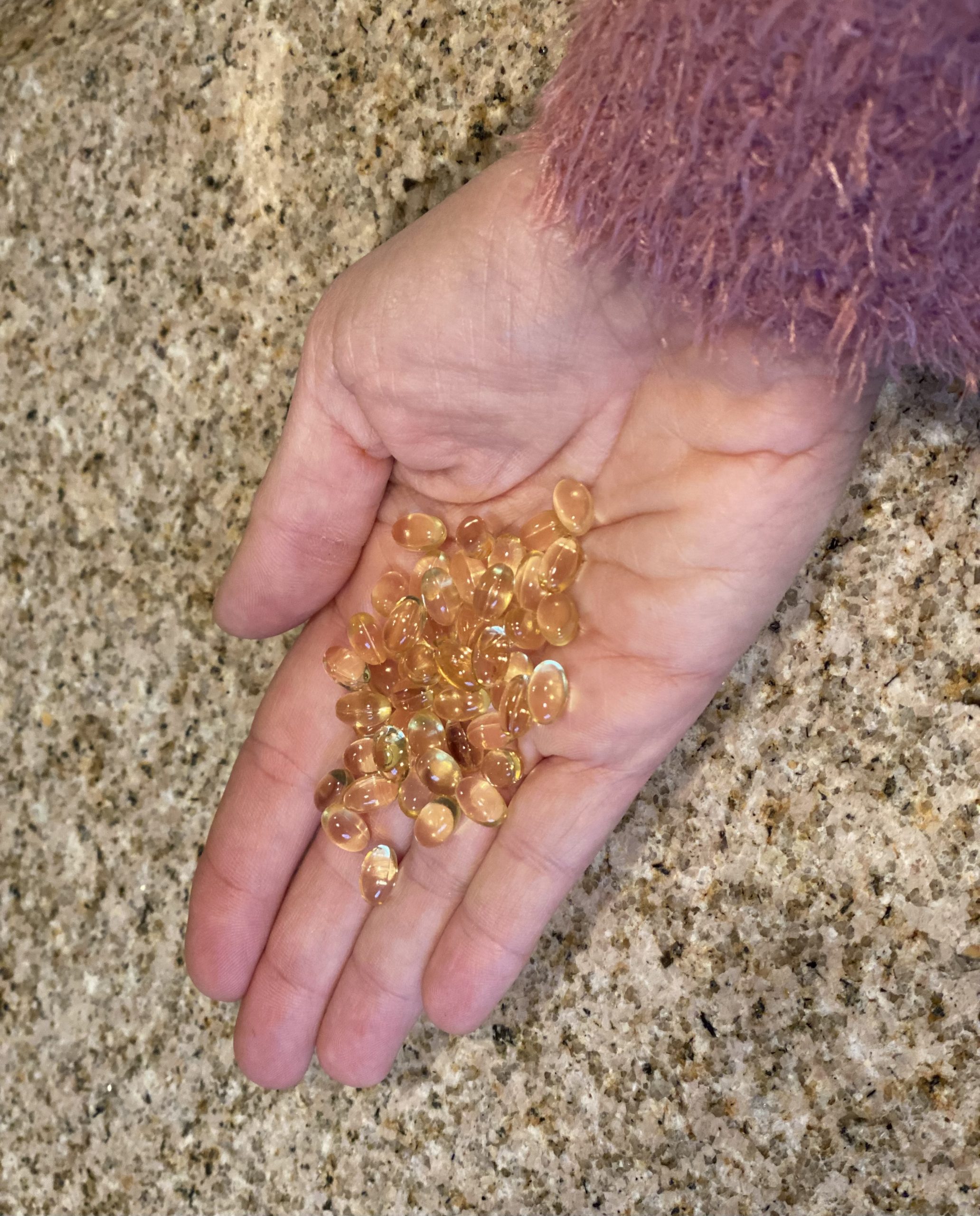We are in the throes of winter here, and, with the exception of a couple of warmer days last week, I have been in full hibernation status. I try to get my Vitamin N when I can (check out my post on that HERE), but I am most definitely a summer girl who suffers in the cold!
In the colder weather, we all spend less time outdoors, and we’re bundled up, which means our skin is getting less exposure to sunlight. This means we’re not making as much Vitamin D naturally in our bodies. On top of that, most of us just don’t have the time to soak up the sunshine in adequate amounts to keep our levels of Vitamin D at an appropriate level. Research estimates the more than 40% of Americans do not have adequate levels of Vitamin D (citation HERE).
So why is Vitamin D so important? And what’s the risk of low levels? First and foremost, Vitamin D plays an important role in bone health. We all talk about the need for calcium, but that calcium needs Vitamin D to do its job (hence why milk is fortified with Vitamins A and D). Vitamin D helps your gut to absorb calcium, and it helps to regulate the levels of calcium in your blood, muscles, and bones.
In addition to its well-known importance to bones, Vitamin D also plays a part in reducing inflammation, as well as metabolizing glucose. It also is needed to modulate cell growth, immune function, and neuromuscular function. (Reference HERE)
There are many other studies that indicate Vitamin D has additional health benefits, including reducing incidence of cancer and mortality from cancer, lowering risk of cardiovascular disease, helping with depression, and reducing the risk of hyperglycemia and Type II diabetes (citations HERE, HERE, HERE, and HERE, respectively).
So if we determine that we need additional Vitamin D, how do we get it? Well, the safest, easiest, and cheapest way is to increase your exposure to sunlight. Get your skin bathing in some sunshine, and your body will manufacture Vitamin D all on its own. For me, this is just NOT happening in the cold winter. When the air hurts my face, there is no way I am exposing any more of my skin to that pain!
My other go-to source of any nutrient is through food. However, very few food sources can provide an adequate intake of Vitamin D. The best sources of Vitamin D in food are fish (tuna, salmon, sardines, herring, swordfish), which provide *some* intake per serving. Egg yolks have a small amount of Vitamin D (about 5% of RDA per serving), but these levels are dependent upon the amount of sun exposure the chicken has, and the amount of D in the chicken’s diet. If you are purchasing farm fresh eggs from what my son calls “happy chickens,” or more commercial eggs from “very unhappy chickens,” your values of vitamin D will be very different. A lot of the foods that contain adequate amounts of Vitamin D are more processed (think cereals with sprayed on vitamins) or supplemented (like milk fortified with A and D). Yes, you can get your daily dose of D from these, but they’re foods that aren’t the healthiest to consume, so, in my opinion, you’ll do more harm than good.
That brings us to supplements. Vitamin D supplements are pretty common, and readily available in most stores that carry supplements, including grocery stores, pharmacies, and even bog box stores like Target and Walmart. And Amazon of course. So what supplement should you buy? Which ones work?
Number one, as with all supplements, is quality. If your supplement has sat in a giant warehouse for untold amounts of time, it won’t work. If it has been transported in a truck, subject to extreme heat or cold in its travels, it won’t work. If it’s a cheaper form (usually labeled as “D” or “D2,” it will typically have come from a cheaper and less quality source than a “D3”. D3 is also more bioavailable than D2, so your body can absorb and use the D3 form better.
Number two, vitamins never work alone. They’re one component of a very complex network of body systems. Vitamin D works well with calcium, magnesium, and Vitamin A, but not well with Vitamin C, B vitamins, and a host of medications (including statins, most antacids, prednisone, and diuretics (“water pills”)). What other supplements do you take, and why? What medications do you take and why? This can help determine if (and how much) Vitamin D supplementation is right for you.
Number three, supplements come in different forms. Again, looking for a D3 supplement, typically, is best. Some Vitamins include additional ingredients to increase absorption, such as MCTs or K2. Again, determine your “why” for taking a D supplement, as well as any other health concerns, to figure out if these additional ingredients will be of more benefit to you. In general, including K2 will help your body better use and regulate the Vitamin D. Adding MCTs or other “fatty” ingredients also increases absorption, as Vitamin D is fat soluble, so your body requires fat in order to break down the D and make it bioavailable.
Number four, people prefer different delivery methods. Some of my clients want a gel pill that’s easy to swallow. Some can’t “do pills” and like a liquid. Some love gummies. You do you. But check those ingredients and quality!!
I stock many varieties of Vitamin D in my store- there’s something for everyone! My nieces and nephews love gummies. My son loves the liquid. I tend to burn through Vitamin D and need high doses to keep my levels up- and to keep my anxiety at bay. I also like vegan sources, and those are in my store, too! Lots of options, all from brands I trust, all great quality, and all are “fresh”: no long warehouse stays or sitting for days in a hot/ freezing truck, or sitting for months on a store shelf. The potency is there!
Click here for a direct link to the many great Vitamin D options I have in my store.
And, as always, I am here to help! Anything from a full evaluation of your needs, to a quick recommendation of “What D should I buy for me,” I’ve got you covered! Shoot me a quick e-mail HERE and let’s find something that works for you!
Blessings,
Melanie

*These statements have not been evaluated by the Food and Drug Administration. Website information and products are not intended to diagnose, treat, cure, or prevent any disease. For educational purposes only.

